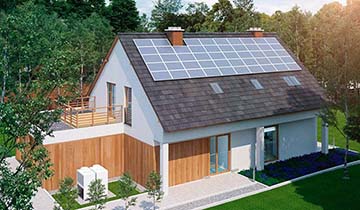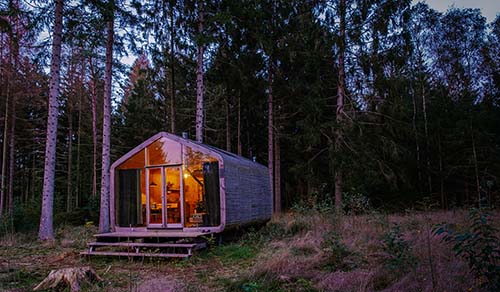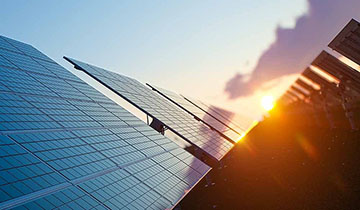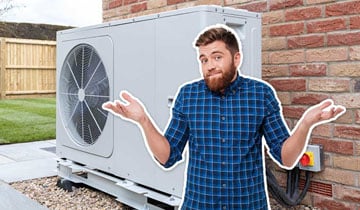8 min read
Electric boilers vs oil boilers for off gas grid heating
If you live in a home that is off the gas grid, you’ll know that there are a wide range of options available to choose from to heat your home. There...

If you’re one of over 2 million homes in the UK not connected to a mains gas supply you know the challenges surrounding heating your home. In this guide we break down the usual off-grid heating candidates (oil, LPG, and heat pumps) but also help to explain why electric heating systems should be at the top of your list, especially with the upcoming changes to the Future Homes Standard, SAP 10 (Standard Assessment Procedure) calculations and the decarbonised grid.
Oil boilers
Oil boilers have been perhaps the most popular choice for heating off grid homes in the UK for a very long time. Instead of being connected to a gas main, you have to have a large oil storage tank on your property and your oil gets delivered by a truck and pumped into your tank. Tanks can be bought outright or rented from your oil supplier on particular tariffs.
Because you have to book oil deliveries there is the possibility that you could run out of oil, although there is now the technology to monitor oil levels and alert you when you’re running low.
Oil produces a large amount of heat by volume so can be classed an efficient way to heat your home, but one of the major drawbacks is that it is not very environmentally. In fact an oil boiler can directly produce up to 5 tonnes of carbon per year by burning the fossil fuel in your home. Not good news for your carbon footprint!
The possibility of environmental contamination caused by a leak is also a consideration and typically, oil costs are around 150% of the equivalent cost of gas but the prices do fluctuate.
So, if you want to heat your off-grid home in the traditional way and you’re not too worried about the environmental impact of burning fossil fuel in your home, go for an oil boiler.
LPG Gas boilers
Using LPG (gas in its liquid form) to heat your home has a few advantages over oil. You still have to install a storage tank on your property but using the LPG is not limited to just the boiler. You can also use the gas to run gas heaters, ovens and hobs which is a fantastic option for homes in areas with an unstable electricity supply.
An LPG boiler still burns a fossil fuel directly, but produces significantly fewer emissions than an oil boiler so environmentally you are better off. The cost of installation is typically higher than an oil system and he running costs are also usually higher. One other drawback with LPG is that you usually have to rent the tank from your LPG supplier which can often result in you being locked into a contract for your off-grid fuel.
Biomass boilers
The cost of installing renewable systems is very high compared to traditional heating systems as the technology is still in the early stages of being adopted, and not yet in the “average” UK home. But if you do decide to invest in a biomass boiler, you can achieve an almost carbon neutral heating system. Burning recycled wood pellets is a much more environmentally friendly alternative to fossil fuel heating systems, so long as you make sure that your pellets are from a sustainable source.
Other than the price, there are other drawbacks to biomass boilers. They do require a lot of space to store your fuel which needs to be added manually and, to maintain efficiency, you have to clean them regularly.
Solar thermal systems
Installation costs of a solar thermal heating system are generally quite expensive as you have to factor in scaffolding, plumbing and the required moderations to your roof. But, for the truly off grid home, a solar thermal heating system is a fantastic renewable heating option, especially if a section of your roof is south facing.
Solar thermal panels don’t take up too much room on your roof and can provide you with hot water throughout the year in a very efficient way. They work by circulating water through tubes in the roof panel which are designed to conduct the heat from the sun and pump the warm water through a cylinder and heat the water for use in your house. Solar thermal systems typically work well with warm water underfloor heating as they don’t require particularly hot water to heat a space.
A solar thermal system is a great way to reduce your heating costs but if you’re living in the UK you will usually need to install a traditional boiler, or one of the other off grid systems listed here, to top up your annual heating and hot water requirement and make sure you’re not left in the cold!
Recent developments in technology and government policy are paving the way for an ultra-efficient electric future. Just like cars, the future of heating is going be electric! Electric heating systems such as electric boilers, electric radiators and electric underfloor heating already have some amazing benefits such as very fast heat up times and close to 100% efficiency at the point of use. But until now, the running costs have always been perceived as quite high when directly compared with gas alternatives and, historically, new properties planning to use solely electric power have been heavily penalised by the energy and planning assessors because the outdated SAP calculations do not take into account the recent efforts to decarbonise the electric grid.
But, on the bright side, all of this is about to change with the UK governments new focus on the Future Homes Standard and SAP 10 (you can read more about this on our SAP 10 & Future Homes Standard blog here). When SAP 10 comes into effect, electricity will be classed as low carbon energy which means homes planning to solely use electric heating will no longer be penalised by the energy assessors and electric power will in fact become more favourable than gas.
Electric radiators
Electric radiators are a more advanced alternative to gas powered central heating radiators. An electric radiator is much easier and cheaper to install, you don’t have to install any pipes, vents or flues and there are no planning issues or permissions needed. All you need is a qualified electrician or a competent person to connect your radiator to the existing electrical supply.
ThermoSphere’s electric radiator range consists of oil filled electric radiators, electric glass flat panel heaters and cost effective electric convector radiators. Every electric radiator in the range benefits from a digital timer to schedule the times that you’d like your heating to come on and switch off. This automatic heating schedule is easy to set up and contributes to the energy efficiency of your heating system by allowing you to “zone” your heating systems with different timer settings per room. This means that, unlike gas central heating, you can easily have the heating on or off in different rooms at the same time which prevents waste and increases efficiency.
An electric radiator is 100% efficient at the point of use. This means that 100% of the electricity that you put into the radiator comes out as heat energy. Find out more about ThermoSphere’s range of energy efficient electric radiators.
Electric underfloor heating
Radiant heating from the floor up is the absolute best way to heat a living space. Electric underfloor heating is much thinner than a traditional warm water underfloor heating system, takes a fraction of the time to install and costs a lot less to buy and have installed under your floors.
An electric underfloor heating system is actually quite simple. It consists of a roll of electric cable which is either laid in an underfloor heating and decoupling membrane, or a roll of self-adhesive mesh with the cable pre-spaced. The heating cable is laid on the floor and the floor finish, usually tiles or engineered timber is laid over the top. The heating cables power cord or “cold tail” is connected to a room thermostat which monitors the temperature of your floor and the temperature of your room to maintain a comfortable temperature while using as little energy as possible.
Running costs of an electric floor heating system, and electric heating in general, have long been a point of concern as electricity does cost more per KW of energy than gas. But, if you set up a heating schedule so that the heating is only on when you need it, factor in the fast heat up time, lower installation costs and the fact that there are no ongoing maintenance costs, and electric cheating system can cost you less overall in the long run. Additionally, if you have solar PV panels on your house your energy is free!
ThermoSphere have an electric underfloor heating system for almost any type of floor and you can check out the options.
Electric boilers are a smart alternative off-grid heating solution and they are gaining in popularity compared with traditional off-grid heating solutions such as gas (LPG) and oil. Below we outline the many reasons why you should consider an electric boiler for your new build or renovation and the implications under the Future Homes Standard and SAP 10.
They are the greener choice
An electric boiler is a much greener choice when compared to LPG gas or oil as there is no need to burn fossil fuel directly in your home. This means that, depending on your electricity supplier, your heating and hot water could be completely carbon free. With no emissions being let off into the atmosphere, electric boilers are a greener choice for the environmentally conscious.
Many electric boilers, like our Slimline Electric Boilers, are between 99-100% efficient vastly outperforming appliances powered by gas or oil which rarely score above 93%.
They’re compact and convenient
Traditional gas and oil boilers can take up a lot of space in your home, especially when you have to have a large tank outside, but the same cannot be said for electric boilers. Electric boilers are small in comparison and you do not need to connect a fuel source, water source, of flue. Most models are designed to fit in a small cupboard, and they do not need to be attached to an external wall or vented, making placement anywhere within your home a lot easier and hassle free. This flexibility means an electric boiler is a great choice for homes with limited space.
Minimal Maintenance
Because an electric boiler, and any electric heating system in fact, is not connected to gas there are no safety concerns to do with carbon monoxide and you don’t have to have an annual service. The only real maintenance that is required for an electric boiler is a clean out of the tank periodically to get rid of any debris brought in with the water. And even this can be avoided by installing a filter on the water supply. In the unlikely event that your electric boiler breaks down, repairs are usually quick and easy and spare parts are freely available.
What about energy assessments and SAP 10?
Electric boilers sound like a great option right? But what about energy assessment and SAP 10? Well, we have news! First published in 1993, SAP, which stands for Standard Assessment Procedure, is the calculation methodology set out by the UK government to calculate the energy performance of homes. It is a requirement of the Building Regulations for all new builds and it is illegal to sell or let a property if it has not passed the SAP regulations.
The updated version of SAP, SAP10, is due to come into effect later this year and as a result the way heating systems are designed will change to comply with the new regulations. SAP 10 takes the decarbonisation of the electric grid into account and favours electricity much more than gas. So, to pass the new SAP calculations developers will lean heavily towards systems that use electricity such as heat pumps, electric boilers, electric panel heaters and electric underfloor heating. If you would like to find out more about SAP 10 how it will change the way homes are heated, read ‘How SAP 10 will impact the heating industry‘.
So in conclusion, the continued development of electric heating technology, flexibility of installation and crucially the updated SAP 10 calculations all point towards a sustainable electric future for UK homes. If you have an electricity supply, an electric boiler is a great solution for off grid hot water and water-based heating systems.

8 min read
If you live in a home that is off the gas grid, you’ll know that there are a wide range of options available to choose from to heat your home. There...

6 min read
The energy crisis and extreme price volatility in fossil fuel markets has had a dramatic impact on the cost of living for many homeowners, and as a...

9 min read
There has been and continues to be a lot of talk around heat pumps being the go-to low-carbon alternative for heating our homes and, to be fair,...